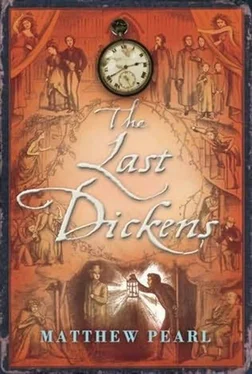
REBECCA HAD RECEIVED WORD FROM A MESSENGER WITH A NOTE to wait for Osgood in the coffee room of the Falstaff. When he arrived, she sat patiently as he hung his hat and his light coat on the peg and put his satchel and a paper-wrapped package carefully on the table. He looked to be in a state of quiet excitement and anticipation. He poured out the whole story of the auction, his escape, and what had been revealed by his meeting with the mesmerism patient.
“Then he is a madman,” Rebecca declared, throwing up her hands. “I suppose that decides it. He'll be no help in remembering anything he heard from Mr. Dickens.”
Osgood made a noncommittal gesture.
“Mr. Osgood,” she pursued, “is it not the case-did you not just explain to me for a quarter hour, that this poor farmer believes himself Dick Datchery, a character from an unfinished novel?”
Osgood crossed his arms over his chest. “What would the novel's state of completion matter in terms of his sanity, Miss Sand?”
Rebecca looked at her employer with a decidedly practical air, but her usually even voice wavered with emotion. “It would be somewhat more reasonable to believe oneself a character in a book that is finished. At least, one would know if one's fate is dire or grand.”
Osgood smiled at her chagrin. “Miss Sand, I admit your skepticism is well-founded, of course. This man calling himself Datchery has suffered a type of mental strain, as we saw with our own eyes at Gadshill. He does not seem to remember anything about a time before he began the sessions, or where he came from. But what if-just think of this-what if the mesmerism sessions performed by Dickens had some unintended effect on an already-shattered constitution, one that could prove to be to our benefit? What if in the process of mesmerism, Dickens transfered, by some profound exposure, the skills of investigation displayed by the fictional character of Datchery onto this man. The man even spoke like Dick Datchery! Look at these.”
Rebecca watched dubiously as Osgood removed from his satchel some books he said he had purchased in Paternoster Row on his way back to the hotel. Each tome examined an element of spiritualism or mesmerism. “These books speak of the fluid of life passing through us. The ability to chase away pain and repair nerves through magnetic forces-”
Rebecca, incredulous at hearing this terminology from her employer, put the cup she had just raised to her lips down with a bang.
“What's wrong, Miss Sand?”
“Some of these are the same titles from Gadshill's library.”
“Yes, they are!”
“Mr. Osgood, you didn't wish me to examine those books at the Gadshill library. You said then that you do not believe one whit in phenomena.”
“Nor have I changed my mind. But Mamie Dickens and her sister Katie confirmed at the Abbey how much Charles Dickens believed in it. Mamie even testified that the mesmerism worked on her. If Dickens, intentionally or accidentally, exposed this man to more information about the novel, even if he doesn't consciously know it, this may be our chance-the best chance to quit England with more knowledge than when we entered it. This man's mind-however disordered-may carry inside it the last strands of The Mystery of Edwin Drood. ”
“What do you propose?”
“To treat him as Datchery. Let him continue the investigation. He wishes to meet tonight at the Abbey. He promises to take me to a secret location he says will provide the answers we seek.”
Rebecca's eyes narrowed at the package on the table.
“Have a look,” Osgood said proudly. “This is what I purchased at the auction, before I was chased out for asking about the statue.”
She unwrapped the edge of the paper. “The glass tazza from the Gadshill mantelpiece!”
“I wanted Miss Dickens to have it back. I thought it would be a small token of our gratitude to the family.”
Rebecca's heart beat at the kindness of the gesture, but her feelings were conflicted and her mouth felt dry. “That is,” she swallowed, “very gentlemanly of you.”
“Thank you, Miss Sand. I must prepare for my outing. This sort of suit would be a phenomenon where we must go tonight, says Datchery.” He cited his new acquaintance approvingly. “I'm afraid I didn't bring anything quite appropriate. But you've been shaking your head so much your bonnet strings are coming loose.”
“Have I?” she returned innocently. “It is only the idea of not knowing where it is you will be going. With a man of an unstable, and potentially shattered mental state, as guide, in a city unfamiliar to you. Consider!”
Osgood nodded. “I thought of consulting with Scotland Yard to secure a police escort, yet it would likely drive away the very man who can guide me. I am a publisher, Miss Sand. I know what it means. It means I must find a way, very often, to believe in people who believe in something else-something I often may not be inclined toward in the least. A story, a philosophy-a reality different from one I have known or will ever know.”
As Osgood readied himself for his expedition, Rebecca sat and stared into the leaves of her tea as though they, too, were endowed with the spiritual or prophetic attributes her employer seemed to want to find in his new acquaintance. She could not help somehow feeling stranded by the decision and how he had come to it.
Osgood returned in a suit only a little less formal. “I am afraid I shall still stand out,” he said, smiling. “We have a letter from Fields today, by the way,” Osgood went on, branching away from the topic with a comfortable businesslike tone. He put a troubled hand at the back of his neck. “Houghton and his man Mifflin, they are like two halves of a scissor, you know. They have formed a journal to compete with our juvenile magazine and are pouring money into it. And the Major announces the Harper brothers will open an office in Boston, no doubt in order to try to drive us into deeper trouble! Harper is not wrong. I cannot shield myself from business realities, not if I want to continue what Mr. Fields has built. And to show that I can be a publisher of the same caliber, that I can find the next Dickens. Miss Sand, I must try everything I can think of.”
“You must,” she said.
“Yet you disagree,” Osgood said. Seeing her hesitate, he said, “Please, speak freely to me about this, Miss Sand.”
“Why did you ask me to come to Chapman and Hall with you the other day, Mr. Osgood?”
He pretended not to understand. “I thought we might need to copy documents-if he had given us any to see. What does that have to do with this?”
“Pardon my saying, but it seemed to me like I was present there only to be, well, womanly.”
Osgood looked like he wanted to move on, but Rebecca's strong gaze would not let the topic go away. “It was true,” he answered finally, “that I had noticed on my previous visit to their firm that there were no female employees there and thought Mr. Chapman just the type of strutting man to speak more easily in front of a pretty woman. You did say you wanted to help by coming to England.”
The color in Rebecca's cheeks flushed carelessly by his untimely compliment. “Not by being pretty.”
“You're right, I shouldn't have done that with Chapman, not without explaining myself to you, at least. Still, I must notice that you are upset all out of proportion about this.”
“Perhaps I am not as talented as Mrs. Collins at speaking bluntly, making suggestions of marriage upon first meetings,” Rebecca said, standing with hands on her hips.
“Miss Sand…” Osgood said, nervously flustered in a way that upset her even more. “This whole conversation is unfathomable to me.”
Читать дальше













